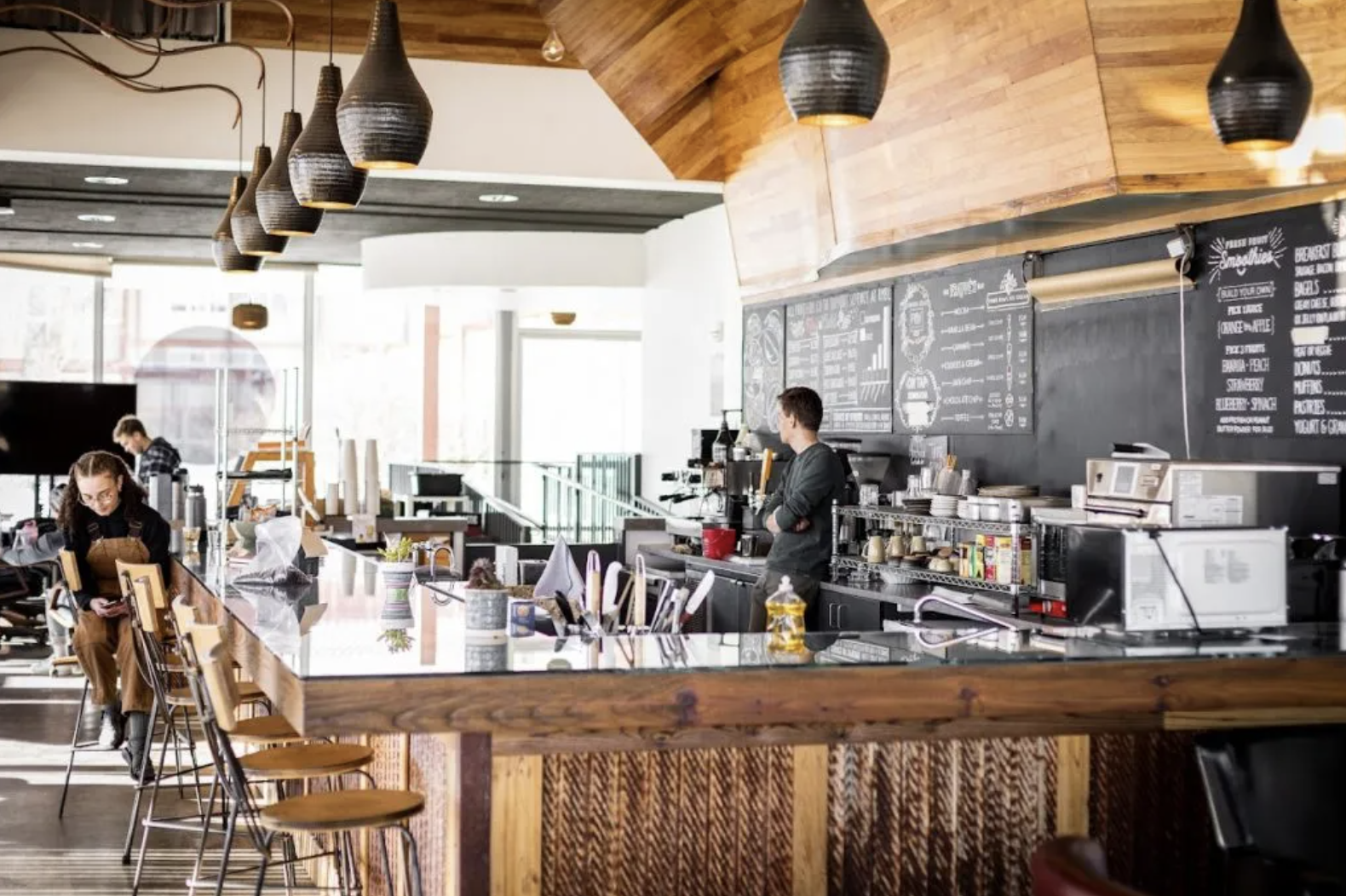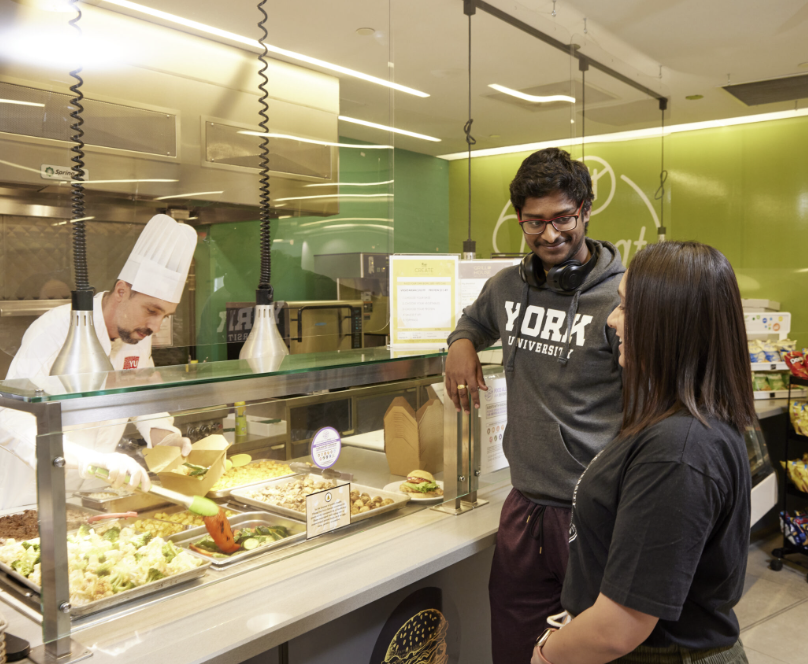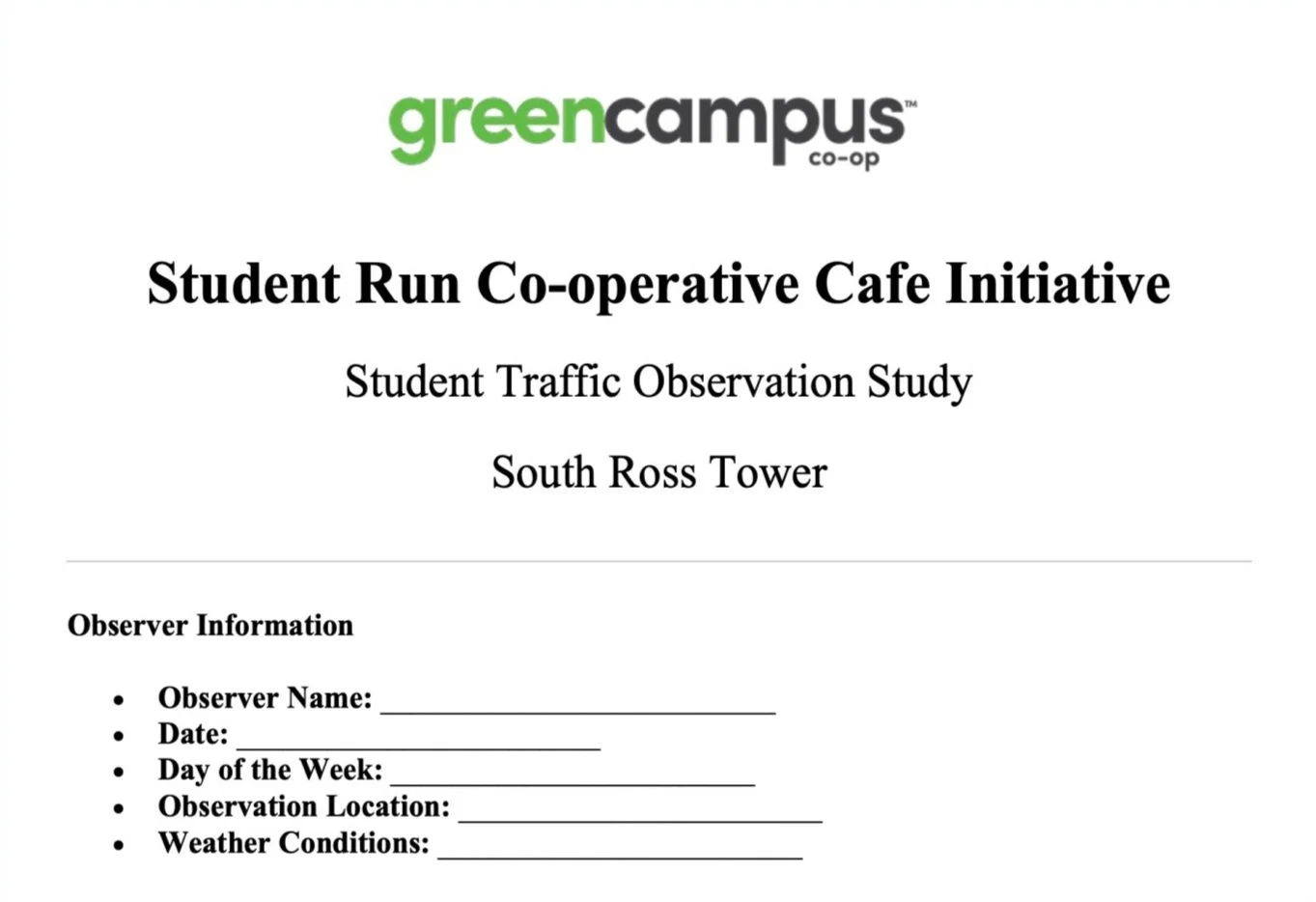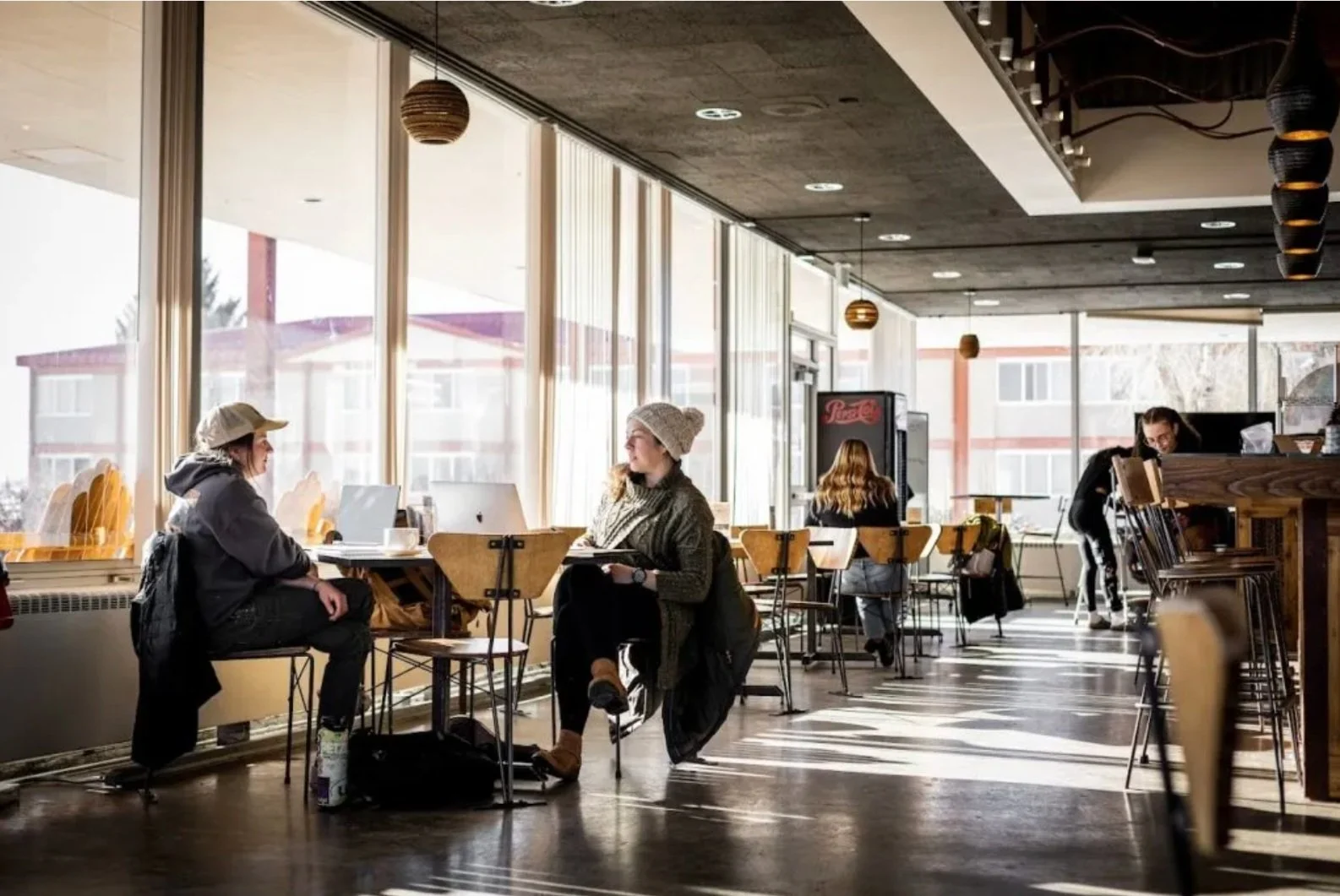Green Campus Co-op
A Student-Run Cafe Co-operative Initiative
Project Partners
York University | Business and Society Faculty | Green Campus Co-op
Project Team
Professors, Graduate Students, Social Scientists
My Role: Project Lead, respnonsible for
QUALITATIVE RESEARCH
QUANTITATIVE RESEARCH
DATA SYNTHESIS & ANALYSIS
PRESENTING INSIGHTS
Background
At York University’s Keele Campus, the lack of a student-run and owned cafe presented a unique opportunity for graduate students and faculty from the Business and Society program, in partnership with Green Campus Co-ops. They proposed establishing a student-run cafe co-operative as a sustainable business model that would cater to the diverse tastes and dietary needs of students. This initiative was intended to not only fill a service gap but also enhance the university’s commitment to social responsibility and sustainability.
However, the initiative faced significant obstacles, including resistance from established food service providers and limited financial support from university administrators. These challenges underscored the need for a robust strategy to demonstrate the cafe’s potential profitability, its alignment with student interests, and its commitment to fair trade and sustainable practices. Successfully proving these points was critical to securing the financial support and grants necessary from the university.
To address these needs, a comprehensive research study was initiated, focused on:
Assessing the best locations on campus for the cafe based on student traffic patterns.
Gauging student support for a co-operative model that emphasizes fair trade and sustainability.
Identifying student preferences for food and beverages to ensure the cafe’s offerings would be both appealing and profitable.
The goal of this research was to provide compelling evidence to university decision-makers about the project's viability and its alignment with the institution’s values, thereby securing the needed funding and support.
The Problem
How to Gain Funding and Grants from York University's Administration to Establish a Sustainable Student-Run Cafe Co-op?
To establish a student-run cooperative cafe at York University, securing financial support and grants from the university was essential. The innovative model of a student-operated cooperative required us to prove the cafe's authenticity, economic viability, and its role as a champion of Fair Trade and sustainability. Demonstrating these aspects were crucial to gaining the necessary financial backing and institutional support to make the project a reality.
Research Questions
- Which campus locations have the highest student traffic and are most suitable for the cafe?
- What level of support exists among students for a co-operative, fair trade cafe?
- What are the food and beverage preferences of students that would ensure a profitable menu?
IDENTIFY THE BEST LOCATION FOR THE CAFE
GAUGE STUDENT SUPPORT FOR THE CO-OP CAFE
UNDERSTAND STUDENTS' FOOD PREFERENCES
Approach
QUALITATIVE RESEARCH
I conducted in-dept interviews and focus groups
I gathered insights into student preferences
I assessed student support for the co-operative model
QUANTITATIVE RESEARCH
Designed and distributed surveys
Conducted systematic observational studies
Collected data on student traffic patterns and preferences
DATA SYNTHESIS & ANALYSIS
Compiled qualitative and quantitative data
Identified key trends and insights
Informed strategic decisions with data-driven analysis
PRESENTING INSIGHTS & STAKEHOLDER ENGAGEMENT
Created detailed reports and presentations
Communicated findings to university administrators
Demonstrated the cafe’s alignment with university values
Data Collection
Research Design and Implementation:
Qualitative Research: I conducted over 58 in-depth interviews and led multiple focus groups to capture nuanced perspectives qualitative insights into student preferences and their support for a co-operative model.
Quantitative Research: I led a team of six Research Associates, together we scored over 1500 surveys and conducted observational studies to gather empirical data on student traffic patterns and preferences. This approach provided a broad, statistical understanding of student behaviors and needs.
Observational Studies: I supervised and conducted systematic observations at four potential cafe locations during peak and off-peak hours to directly assess student traffic flow and student congregation points.
In-depth Interviews
I conducted 58 in-depth interviews with both undergraduate and graduate students to gather insights into their perspectives on the business model of a student-run co-operative cafe. These interviews also explored their views and understanding of Fair Trade, and the importance of local and sustainably sourced food and beverages. The insights gathered were crucial in shaping the development and strategic direction of the cafe.
Student Traffic Flow Observation Study
I developed an Observation Study Log, which my team and I utilized over a four-month period to observe and record the movement patterns of students around potential cafe locations at York University.
The aim of the study was to understand how students move through these areas, helping to identify the optimal spot for the cafe based on high foot traffic and visibility.
Data Handling and Analysis:
Data Synthesis: I integrated findings from both qualitative and quantitative methods to form a comprehensive view of the campus environment and student demands. This synthesis allowed for robust, data-driven conclusions.
Analysis: I utilized statistical tools and qualitative analysis techniques to interpret the data collected, focusing on identifying patterns that would inform the cafe's location and menu design.
Stakeholder Engagement and Insight Presentation:
Stakeholder Interaction: As a Project Lead, I engaged with university administrators, faculty, and students to ensure the research aligned with broader institutional goals and addressed real user needs.
Insight Dissemination: I prepared and presented detailed reports and visual presentations to communicate strategic insights to stakeholders, effectively showcasing the project’s potential profitability and its alignment with the university’s values.
Stakeholder Communications
Throughout the research, I maintained direct, one-on-one communications with key university stakeholders:
CFO: Updated on budget and financial implications.
Co-op Head: Discussed alignment with co-op principles.
Faculty Director: Held meetings to update on research progress and timelines.
Research Insights
The study confirmed strong potential for the cafe’s profitability and significant student interest in the co-operative venture, while also highlighting diverse dietary needs. These findings underscored the importance of offering fair trade, local, and sustainably sourced food options, proving that a student-run cafe co-op would notably enhance York University’s image as a leader in supporting and undertaking green, sustainable initiatives.
Research Insights Summary
Location Viability:
Promising Locations: The observational study pinpointed South Ross Tower and Vanier College as highly promising locations for the cafe due to significant student traffic and a notable absence of nearby food vendors. These locations combine high visibility with convenience, making them ideal for the cafe.
Student Demand and Support:
Understanding and Enthusiasm: Surveys and one-on-one interviews revealed that approximately 70% of the student body understands and is enthusiastic about the co-operative business model. Additionally, over 60% of these respondents expressed interest in actively working and becoming members of the co-op.
Support for Sustainable Practices: A substantial 90% of students supported the idea of offering fair trade, locally sourced, and sustainable food and drink options at the cafe.
Food Preferences:
Dietary Restrictions: About 65% of students reported having dietary restrictions due to religious reasons, personal choices, or allergies.
Demand for Diverse Food Options: There is a high demand for Vegetarian, Vegan, Halal, and Organic food choices. Importantly, students expressed a preference for these options to be offered without an additional price markup, emphasizing the need for affordability alongside diversity and quality in food offerings.
Impact
Secured $1 Million in Funding and Grants from This Study
The comprehensive research insights laid a strong foundation for the development and planning of the Green Campus Co-op's student-run cafe, aligning perfectly with student needs and preferences while promoting sustainability and student involvement. These insights clearly demonstrated the demand and strategic necessity for establishing the cafe, playing a crucial role in securing support and funding from university stakeholders. Eleven months after completing this study, the Green Campus Co-ops along with the Business and Society faculty successfully secured a location at South Ross Tower. With financial support from York University's administration, the construction of the cafe began. After several months of construction and final preparations, the cafe, now named "et al. Cafe," opened its doors to grad students and faculty.














